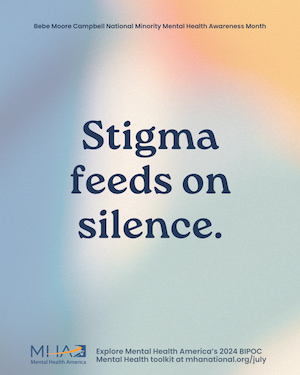By Mental Health America
Each July, we honor the legacy of author, advocate, and trailblazer Bebe Moore Campbell by recognizing Bebe Moore Campbell National Minority Mental Health Awareness Month (also known as BIPOC Mental Health Month).
Moore Campbell’s ability to tell impactful stories highlighting themes of racism, mental health, and family left a lasting mark on this world and is a foundation for much of the work that continues in support of Black, Indigenous, and people of color (BIPOC) mental health.
Throughout her work, Moore Cambell did not shy away from the realities of what it meant to live as a Black person in America. Her book, “Your Blues Ain’t Like Mine,” was inspired by the murder of Emmett Till and deemed as one of the most influential books of 1992 by the New York Times. Moore Cambell continued to write of real events that impacted Black and marginalized communities, such as her work in “Brothers and Sisters,” which takes place in Los Angeles following the Rodney King riots. By highlighting these issues, Moore Cambell brought themes of environmental impact, race, and community connections to the forefront of American literature.
Her early books drew attention to the harsh realities of racism and the way that this continued trauma can show up in everyday life. Her later books continued with similar themes and included strong ties to mental health, as well as the importance of community bonds, leaning on family and friends, and finding support during an individual’s treatment and recovery journey. Additionally, through her advocacy efforts, Moore Cambell continued to engage with community members, connect individuals to support networks, and create spaces that were truly inclusive for those within them.
Moore Campbell passed away on Nov. 27, 2006, but through her powerful storytelling, advocacy, and strong community roots, fellow advocates continued her fight. Mental Health America honors her unforgettable legacy each July by releasing an outreach toolkit and campaign that gives individuals throughout the country the tools they need to educate themselves and others. Her legacy lives on, providing a powerful foundation for marginalized communities to thrive and be known.


